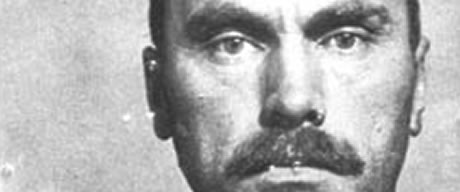In December 1907, Carl was in the city of Helena, Montana, where he misrepresented his age and got himself enlisted in the U.S. Army, and joined Company A as a private. But the disciplined life of the armed forces was not Carl’s cup of tea, and he was charged with insubordination on the very first day. And within a month he had already been jailed many times over for petty offences. He was forever drunk and was completely uncontrollable. In April 1908, he was caught stealing and was forced to plead guilty to three counts of larceny, and was sentenced “to be dishonorably discharged from the service of the United States, forfeiting all pay and allowances due to him, and to be confined at hard labor at such place as the reviewing authority may direct for three years”. The sentence was approved by the future President of the United States, William Howard Taft, who was the Secretary of War back then. May 1908 saw him committed to the confines of Leavenworth Federal Penitentiary to serve his sentence.
At Leavenworth Federal Penitentiary, the prisoners were governed by a harsh code to maintain discipline. And the prison authorities had no idea that Carl was all of 16. So, he was treated like a full grown man, like all other prisoners. Among the strict measures that were rigorously enforced was the code of silence, which governed that unless it was permitted or was required due to some emergency, the prisoners were not supposed to speak. And anybody who spoke out of turn was severely punished. Carl was never known for obedience and no amount of punishment of any kind could force him to change his ways. So, he was given severe beatings on a number of occasions for violating different rules at different times. Torture was regularly used to keep the prisoners in line, and Carl was often found in violation. Soon he was fed up and wanted to get away from the Penitentiary, but could not find a chance to even attempt it. So, he took his anger out on a workshop by burning it down and thus causing a loss of over $100,000. He was never held accountable for it because the fire could not be connected to Carl. And there is no official record suggesting that Carl was even a suspect ever.
Carl had to lug around a 50-pound ball that was tied to him so as to prevent him from attempting an escape. He was made to break rocks in quarry for as long as 10 hours everyday and he did without complaining. He grew stronger and more muscular and was further embittered by the treatment meted out to him. However, there was no escape for him. When he was finally discharged in 1910, he was a thoroughly mean soul. According to him, whatever little goodness he might have had was also “beaten and kicked” out of him at Leavenworth. Little did he know that he would return to the same place one last time, which would be his last confinement in any human prison. But that was to happen twenty years later.
Out of Leavenworth, he was just 19, but having spent a good part of his life in prisons and reform homes, he had no place or family to go back to, and nothing had prepared or trained him for a civil life in a human society. So far as his own take on his state of mind back then is concerned, he said, “All that I had on mind at that time was a strong determination to raise plenty of hell with anyone and everybody in every way I could.”
So, he drifted all across Kansas, Texas, through the Southwest and into California committing different crimes at different locations and was arrested many a time under his adopted name “Jeff Baldwin” for vagrancy, arson, burglary and robbery. But he did not stay in prison for long and managed to run away from the prisons in Rusk, Texas, and The Dalles, Oregon. All he wanted to do is destroy and cause as much loss of life and property as he could. So, he would try to kill just about anybody who gave him the slightest provocation and would want to burn down anything that he felt he could easily set afire.

During his burglaries, the first thing he looked for and took away were handguns. Hekept moving from one place to another leaving behind him burglarized homes, burnt churches, and raped and killed human beings. The police did manage to catch hold of him on numerous occasions, but failed to keep him within the confines of the prison walls for long.
Carl killed and burned indiscriminately, and the same indiscrimination spilled into the rapeshe committed on men and boys. “Whenever I met one that wasn’t too rusty looking I would make him raise his hands and drop his pants. I wasn’t very particular either. I rode them old and young, tall and short, white and black. It made no difference to me at all except that they were human beings,” he revealed years later.
In 1911, Carl Panzram was operating under the name “Jefferson Davis”, and was arrested in Fresno, California for stealing a bicycle and was awarded six months in prison, but he escaped after serving 30 days. He dug out the stolen guns he had buried outside town before his arrest, and got on a freight train going to Northwest. He came across two men and was thinking of raping the younger one before a railroad police officer came upon them intending to extort money. Carl pulled his gun out and raped the police officer at gunpoint while the other two men watched. He then turned his gun on those two and forced them to rape the police officer before throwing all three of them out of the train. He continued his journey until he reached Oregon. At Oregon he was part of the crowd of seasonal workers, who came to earn a living. When the work they did, did not pay well enough, they took to other means.
The hard life Carl lived turned him into a hardened criminal by 1913. He was a good looking, muscular man, who attracted women, but never displayed any interest in the opposite sex. He had taken another name during this time. And he was now known—rather arrested — as “Jack Allen”. He was put behind bars for highway robbery, assault and sodomy at The Dalles, Oregon, but always broke out of jail after 2 or 3 months. He broke jail with a number of other inmates. He travelled to Idaho leaving Dalles behind. But he was apprehended within weeks and was in another prison, where he would have a very brief stint. On the very first night he started a massive fire in one of the buildings and escaped alongwith a number of other inmates. He quickly went North and entered Montana. But there again he found himself behind bars at the Montana State Prison at Deer Lodge, sentenced to a year in prison for burglary as “Jefferson Davis”. The prison was more of a castle with guards with rifles, who would shoot at anybody who tried to escape. As per the admissions log of the prison, Carl was taken in at Deer Lodge on April 27, 1913, and his occupation was listed as “waiter and teamster”.
At Montana prison, he came across his old cellmate, Jimmie Benson, who had been with him at Montana Reform School, and was now doing a 10-year term for robbery. An escape was quickly planned between them, but Benson was transferred at the eleventh hour and Carl escaped alone on November 13, 1913 fleeing to Butte, where he was arrested again for burglary as “Jeff Rhodes”. An additional year was added to his total term of imprisonment for the escape and he was sent back to the state prison. It was Deer Lodge again. The prison was badly mismanaged owing largely to the lack of adequate staff. There was little that the prisoners did all day long except for lying in their respective bunks and day-dreaming. Carl, due to his massive size and muscles coupled with the reputation of being angry and ferocious, managed to intimidate other inmates and have his way with them. Carl re-called later, “At that place I got to be an experienced wolf. I would start the morning with sodomy, work as hard at it as I could all day and sometimes half the night.” He served his complete sentence at Deer Lodge and was released on March 30, 1915. “When I left there, the warden told me that I was pure as lily, and free from all sin. He gave me $5, a suit of clothes, and a ticket to the next town six miles away,” Carl wrote later.
Carl was back to his usual ways— stealing. Soon enough he was caught again when he tried to sell a stolen watch, and was sentenced to seven years at the Oregon State Penitentiary in Salem under the name “Jefferson Baldwin”. He was admitted into the prison on June 24, 1915 as inmate #7390, and his occupation was listed as “thief” together with the two aliases he used, “Jefferson Davis” and “Jeff Rhodes”.
Carl was as uncooperative as ever against a brutal prison system, in which disobedience was just not tolerated, but was also severely punished for. Shackling to walls, hanging from the roof for hours and whipping with the multi-tailed and terribly hurtful “cat-o-nine-tails” were regular forms of punishment.
The prospect of punishment did not deter Carl from keeping his combative and disobedient ways in check, which resulted in severe punishments at different times as per his official record of discipline. On January 1, 1916, Carl was hung for 10 hours a day for two days consecutively for indiscipline and cursing an officer; on February 27, 1916, he was hung for another 12 hours for another act of indiscipline. When he was found in possession of a blackjack, he was cast into “dungeons” for three weeks to survive only on bread and water. None of it made Carl mend his ways. He caused many fires and burnt down three buildings at different occasions. He got to spend 61 days in solitary confinement with no light, where he had to grope for cockroaches to survive on. In 1971, he managed to let Otto Hooker, a fellow prisoner, out of the prison. Hooker ended up killing Warden Minto when he came across him in a nearby town.
After making several attempts at escapes, Carl finally succeeded on September 18, 1917. He was back into the world for another stint at stealing, burning and killing.
Originally written for and published in LAWYERS UPDATE as a four-part ‘Crime File’ in December 2013.






